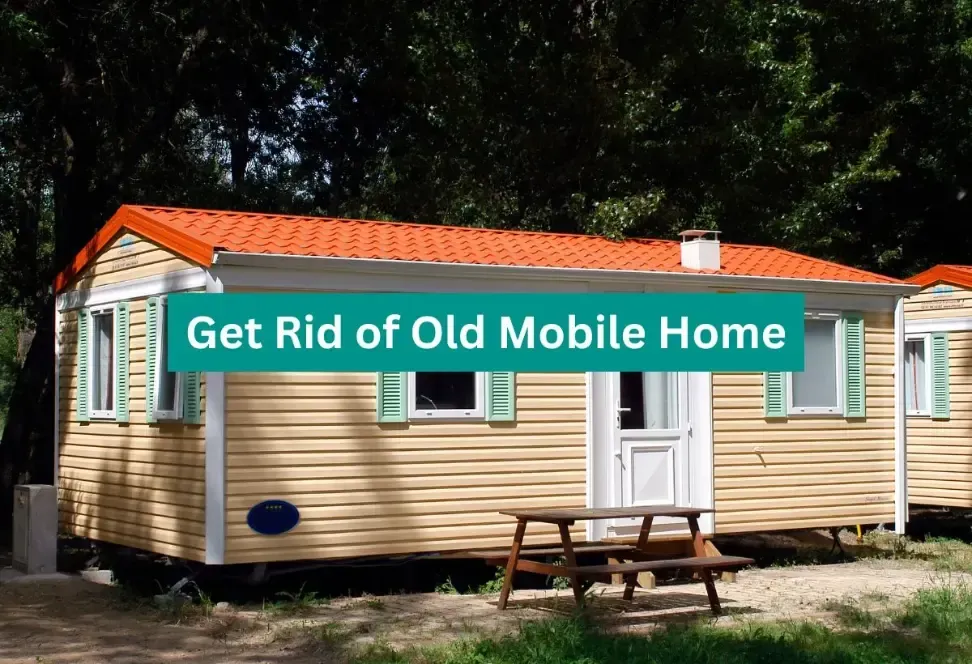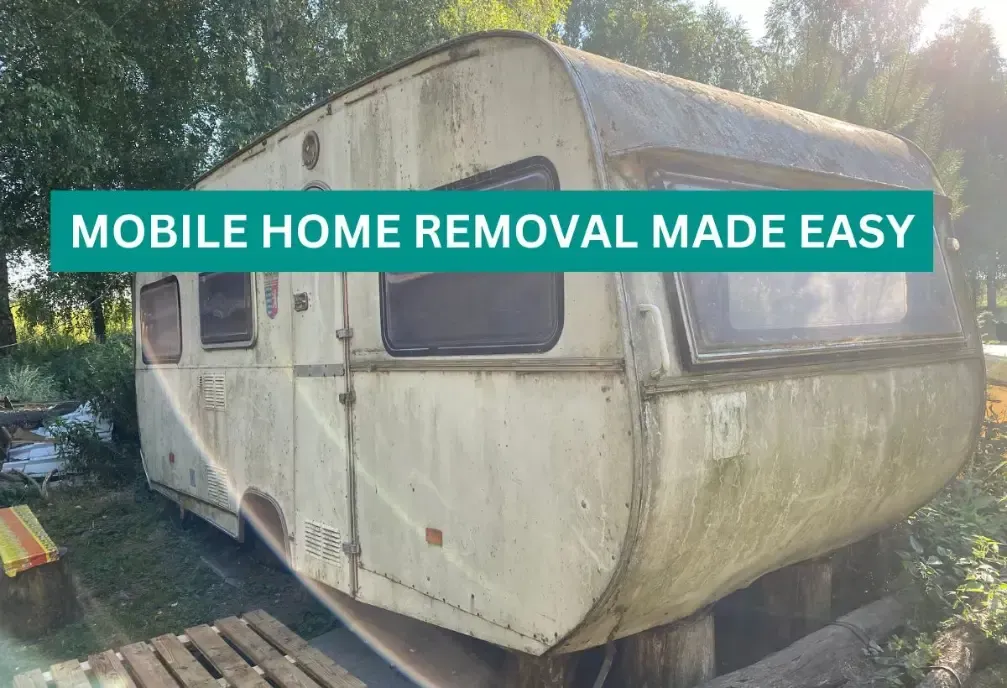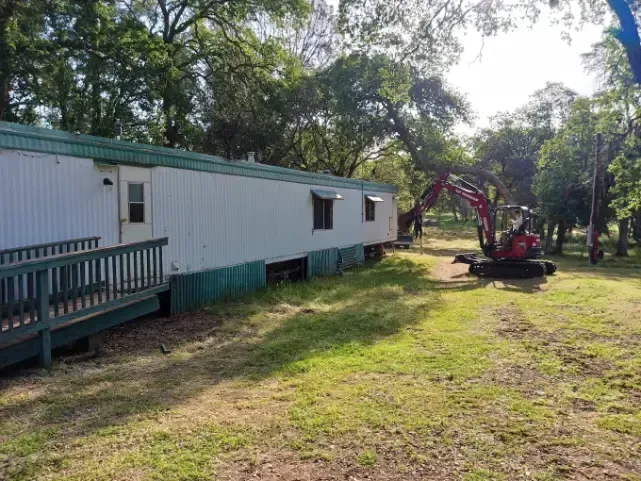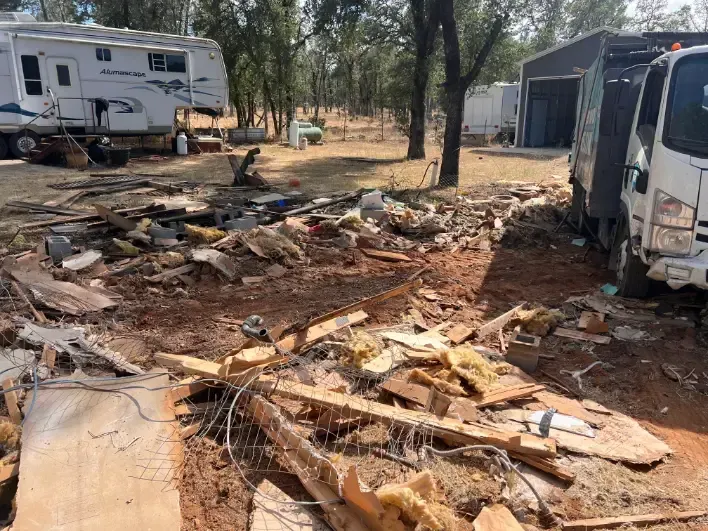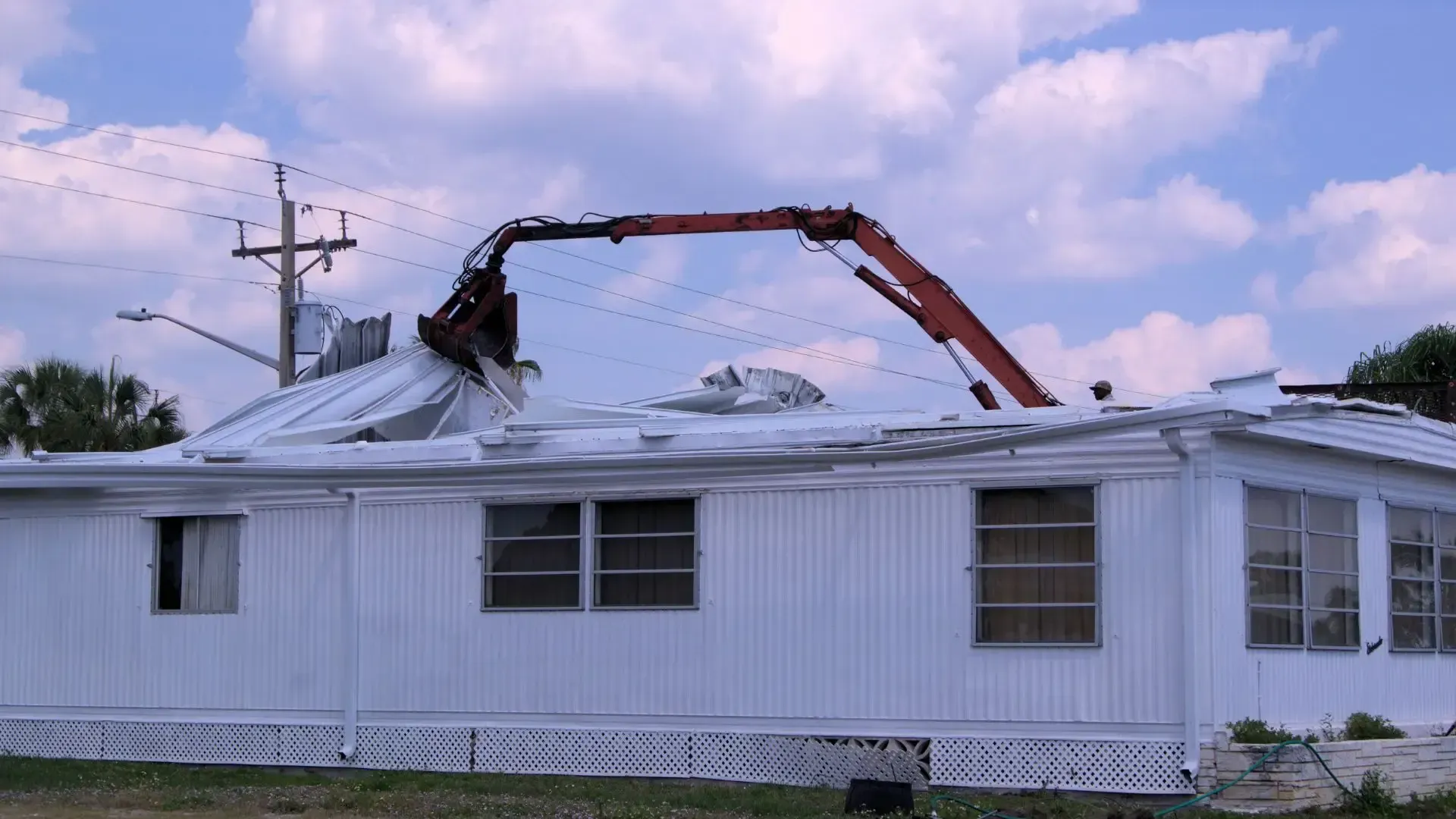How to Choose the Right Demolition Contractor for Your Mobile Home
Are you staring at an old mobile home in Sacramento, CA, and dreaming about what could be? Whether it's rebuilding on the same spot or simply clearing space, demolishing a mobile home is a big step towards making new plans a reality. But where do you start, and how do you ensure it’s done right?
This guide dives deep into everything you need to know about demolishing your mobile home in Sacramento, CA, from selecting the right demolition contractor and understanding the specific demolition requirements, to navigating the complexities of safety protocols and environmental considerations in Sacramento, CA. Read on to discover how to manage your demolition project efficiently, safely, and with minimal environmental impact in Sacramento, CA. Get ready to clear the old and prepare for the new with confidence!
Introduction: Picking the Perfect Pro for Your Mobile Home Makeover!
When it comes to demolishing your mobile home in Sacramento, CA, the stakes are as high as the structures themselves. Choosing the right demolition contractor isn't just about getting the job done; it's about ensuring the job is done right, safely, and with respect to both the environment and your future plans. Whether you're clearing the way for a dream home or simply reclaiming space in Sacramento, CA, the right contractor can make all the difference.
In this guide, we'll dive into the key factors you should consider to ensure you pick a demolition expert who not only knocks down buildings but also exceeds your expectations in Sacramento, CA. From understanding their credentials and experience to evaluating their commitment to safety and the environment, we’ll help you build the knowledge you need to destroy with confidence. Let’s break it down (pun intended) and find out how to choose the demolition contractor that’s right for you in Sacramento, CA!
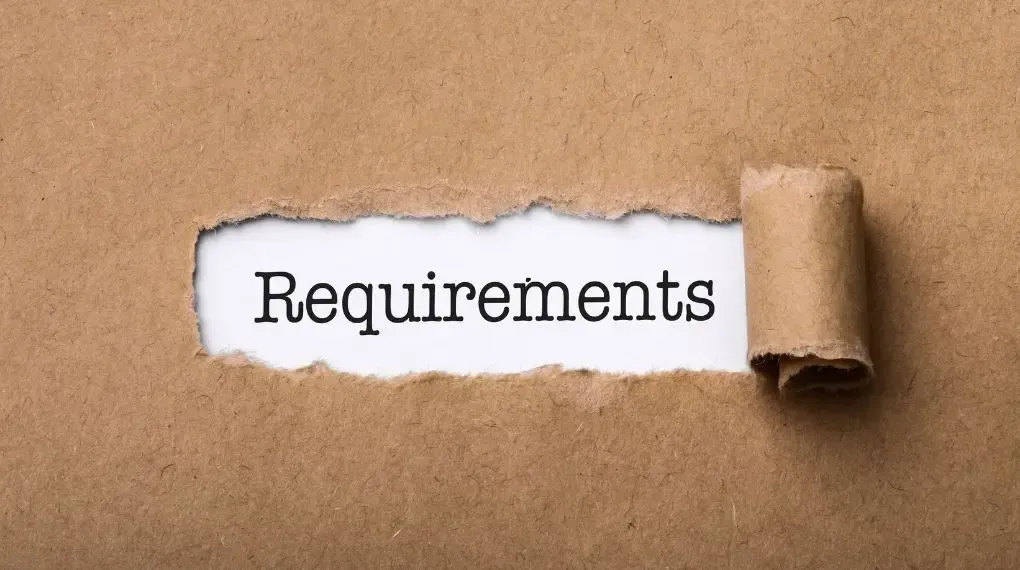
1. Understanding Demolition Requirements
Demolishing a mobile home is not just about tearing down an old structure—it’s a meticulous process that requires a deep understanding of both the physical and regulatory landscapes in the demolition industry. Mobile homes, unlike traditional homes, often have unique building materials and layouts that demand specialized demolition services. Let’s dive into what that really involves.
The Specifics of Mobile Home Demolition Needs
Firstly, mobile homes are typically constructed with lightweight materials and are often mounted on a chassis with a permanent or semi-permanent foundation. This unique setup means the demolition process starts with a careful disassembly concrete removal of the home’s base and supports, which is quite different from brick-and-mortar structures. The approach is more about deconstruction—carefully taking the home apart, piece by piece, which prevents unnecessary damage to the underlying land and reduces the volume of debris removal.
Additionally, many mobile homes contain materials like aluminum and particle board, which react differently under demolition stress compared to traditional wood or concrete demolition. For instance, aluminum can be salvaged and recycled, but it requires careful separation from other materials, which adds a layer of complexity to the demolition process. Particle board, on the other hand, tends to break apart in large chunks, which can be hazardous if not managed properly by demolition services.
The Importance of Specialized Skills and Equipment
The demolition of a mobile home is not a job for general contractors; it requires a team with specialized skills. Professionals skilled in mobile home demolition understand the best practices for dismantling these structures safely. They are trained to identify load-bearing components and know how to manage the peculiarities of manufactured home construction, such as dealing with often tightly compacted insulation and plumbing that is not always logically laid out.
The equipment used is also specialized. High-reach demolition excavators and material handlers are often overkill for a mobile home. Instead, smaller, more precise equipment like mini-excavators or even manual tools like saws and pry bars might be used to disassemble parts of the home before larger machinery is used to remove the debris. This equipment must be operated with a finesse that preserves the integrity of salvageable materials and avoids causing damage to the surrounding environment.

2. Licensing and Certification
Launching a mobile home demolition project in Sacramento, CA? Let's dive into why hiring a licensed and insured demolition contractor isn't just good practice—it is absolutely essential. Furthermore, I will give guidance on how to verify credentials so you'll feel fully comfortable in your choice.
Why Licensing and Insurance Are Crucial
Licensing provides an important seal of approval from regulatory bodies, showing that your demolition contractor meets specific industry standards while understanding all the complexities of demolition work, such as safety, waste disposal, and environmental impact. This is especially essential in mobile home demolition due to its unique construction and materials involved.
Insurance plays an essential defensive role during demolition projects. It safeguards you from liability in case of accidents or property damage, protecting you financially if something unexpected arises that necessitates costly repairs or lawsuits from demolition contractor's crew members who get hurt on your site. Furthermore, coverage extends to the crew themselves, so if an injury occurs on your property no liability claims or medical costs arise as a result of negligence from these professionals.
How to Verify Contractor Licenses and Identify Key Certifications
Verifying a demolition contractor's license is simple yet essential. Most states offer online search portals where you can enter their license number to check its validity as well as for any past violations or penalties that could provide a measure of their reliability and compliance with legal standards.
When it comes to certifications, there are a few standout certifications that distinguish reliable demolition contractors,
- OSHA Certification
Certification from OSHA is crucial to ensure contractors adhere to safety standards that safeguard both their team and your property. - NDA Membership
Joining the National Demolition Association shows commitment to upholding best practices and being abreast of industry trends and standards. - Environmental Certifications
Given that mobile homes contain materials like asbestos or lead, their handling and disposal must comply with environmental safety regulations. Contractors certified as environmental safety project managers must demonstrate their ability to oversee these aspects efficiently while simultaneously protecting the ecosystem while complying with state and federal laws.
Don't hesitate to ask potential contractors for proof of their certifications; any trustworthy one should gladly share this information. This step goes beyond simply ticking boxes--it helps ensure they can handle the unique challenges associated with demolishing a mobile home safely, responsibly, and legally.

3. Experience and Expertise
Experience is no mere bonus when it comes to mobile home demolition; rather, it is essential. Every demolition project poses its own set of unique challenges that must be managed effectively for optimal results. In this section, we'll examine why expert knowledge matters in demolition projects as well as provide some case studies that illustrate these points vividly.
The Critical Role of Experience in Demolition
Experience in demolition goes beyond simply knowing how to dismantle structures; it also encompasses knowledge in project planning, safety management, regulatory compliance, and environmental responsibility. Experienced teams excel at anticipating potential issues before they occur—such as unexpected structural complexities or environmental hazards like asbestos or lead often present in older mobile homes.
Experienced professionals possess an acute understanding of different materials and construction styles used in mobile home demolitions, which vary significantly. They carry out the demolition in a professional and reliable manner which ensures an efficient demolition that minimizes waste by recycling or reusing as much material as possible.
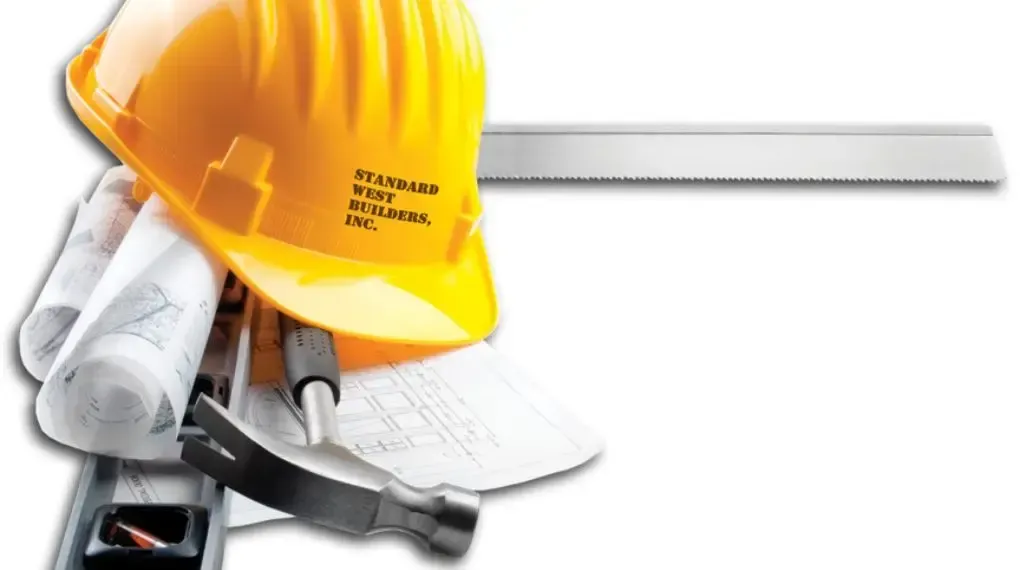
4. Safety Protocols and Standards
In dismantling or any sort - be it an industrial demolition or tearin down a mobile home - prioritizing safety is not just a precaution; it’s a critical requirement. Here, we’ll delve into the essential safety measures that should be in place during demolition projects, and the specific questions you should ask to ensure these practices are being followed meticulously by your demolition contractor.
Key Safety Measures in Demolition
Safety during demolition entails taking steps and following protocols designed to protect all parties involved, from workers and clients to the surrounding community. Residential demolition, like that of mobile homes, requires special consideration due to its unique construction materials.
Personal Protective Equipment (PPE) is essential when working in mobile homes, such as hard hats, safety glasses, gloves, and steel-toe boots. As these homes often contain materials like glass and metal which could potentially contain asbestos fibers, respiratory protection is also a necessity.
Second, structural assessment should never be neglected as a critical preliminary step in any demolition plan. This involves inspecting the mobile home to identify any structural weaknesses or hazardous materials requiring special handling—this evaluation ensures that methods used don't pose unexpected risks.
Environmental controls are another essential form of safety protection, taking steps to contain dust, debris removal, and any airborne particles in areas with populations or sensitive environments. Techniques might include spraying water to minimize dust or installing temporary fencing to keep debris at bay.
Finally, an emergency response plan must be in place. This plan should outline procedures for handling accidents that might arise, from minor injuries to major incidents. Having this plan ensures all team members know exactly what steps should be taken in an emergency, which is key for quick responses and effective incident management.
Questions to Assure Compliance with Safety Protocols
Here are a few questions you can pose to a demolition contractor to verify their commitment to safety:
- Which safety training are your employees receiving?
Keep an eye out for contractors that provide regular training on the latest safety protocols and emergency procedures, both general training as well as specific to demolition equipment and hazardous material handling. - Would you please provide information on your most recent safety audit?
Reputable demolition contractors should regularly audit their safety procedures and openly discuss any findings or any issues identified as part of this assessment process. - How should hazardous materials be managed?
As older mobile homes could contain asbestos or lead, make sure your contractor has an approved plan in place for handling and disposing of such materials, including proper disposal. - What is Your Incident and Injury Rate?
An impressively low rate of incidents and injuries is an effective measure of contractor commitment to safety. Furthermore, this demonstrates how they implement their safety protocols effectively. - Do you employ a dedicated safety officer on site?
Engaging the services of an experienced team with dedicated safety professionals during demolition shows an increased commitment to upholding safety standards throughout the project.

5. Environmental Considerations
As with any form of demolition, taking town a mobile home should consider its environmental effects carefully. Here, we explore why responsible recycling and junk removal services are crucial while giving tips on assessing a demolition contractor's commitment to environmental preservation.
Why Environmental Responsibility Matters
Demolition of mobile homes produces vast quantities of waste, and how it's managed has an immediate effect on the environment. Prompt disposal and recycling practices are critical to complying with environmental regulations as well as minimizing carbon emissions during demolition processes. Effective waste management means sorting recyclable materials such as metals, certain plastics, and wood into separate piles for recycling while safely disposing of hazardous materials like asbestos or insulation according to safety standards.
Recycling and disposal practices that promote resource conservation help decrease the amount of waste that ends up in landfills, conserving natural resources while decreasing the demand for new materials. For instance, metal extracted from mobile homes can be reused across industries for recycling purposes, saving on energy and resources otherwise needed to produce new metal products.
Evaluating a Contractor’s Environmental Commitment
To truly gauge whether a demolition contractor is committed to protecting the environment, consider these specific aspects,
- Ask about their waste management plan. A conscientious contractor will have an elaborate waste management plan outlining how materials are sorted, processed, disposed of, or recycled at their site; they should also be able to offer details regarding what percentage of materials from an average demolition they can recycle or reuse.
- Inquire about certifications. When seeking environmental management contractors, look out for certifications such as ISO 14001 to indicate they adhere to international standards in environmental management.
- Check for compliance with regulations. It is important that contractors have an excellent record with environmental compliance. You can do this through checking with local or state environmental agencies responsible for waste management and pollution control.
- Request references or case studies. A contractor that takes pride in their environmental practices should be happy to share success stories or references from past projects that demonstrate real-world evidence of their practices and results.
- Discuss how they handle hazardous materials. Correct handling and disposal of hazardous substances are vitally important to protecting our environment, so the contractor should have established clear protocols for dealing with such substances, while remaining up-to-date on regulations and best practices in relation to handling/disposing of them safely.

6. Cost and Contract Terms
Navigating the financial ramifications of dismantling a mobile home may seem intimidating, but with the right knowledge, you can approach this topic with confidence. Here, we'll cover common pricing structures associated with residential and commercial demolition services as well as provide insightful advice for reviewing and understanding contract terms before making any commitments.
Decoding Pricing Structures and Cost Factors
Demolition costs vary significantly based on several different elements, making an accurate estimate difficult. Understanding these components will allow you to better estimate expenses:
- Size and Complexity: The more large-scale and intricate the residential demolition or commercial demolition structure is, the higher its costs will be due to increased labor, time, and equipment requirements.
- Location and Accessibility: Demolishing a mobile home located in an isolated or difficult-to-reach area may cost more due to transport expenses associated with heavy machinery, as well as disposal fees if there are no nearby recycling or waste facilities.
- Material Composition: Different materials require unique handling procedures when they contain hazardous elements like asbestos or lead. Proper removal and disposal are key, but costs associated with their disposal should also be factored in.
- Recycling and Disposal: Recyclable materials reduce disposal costs, but sorting through and recycling materials adds to labor expenses.
- Permitting and Regulatory Compliance: Costs associated with acquiring necessary permits vary based on local regulations; compliance with environmental and safety requirements may incur further expenses.
Tips for Reading and Understanding Contracts
Demolition costs vary significantly based on several different elements, making an accurate estimate difficult. Understanding these components will allow you to better estimate expenses:
- Size and Complexity: The more large-scale and intricate the residential demolition or commercial demolition structure is, the higher its costs will be due to increased labor, time, and equipment requirements.
- Location and Accessibility: Demolishing a mobile home located in an isolated or difficult-to-reach area may cost more due to transport expenses associated with heavy machinery, as well as disposal fees if there are no nearby recycling or waste facilities.
- Material Composition: Different materials require unique handling procedures when they contain hazardous elements like asbestos or lead. Proper removal and disposal are key, but costs associated with their disposal should also be factored in.
- Recycling and Disposal: Recyclable materials reduce disposal costs, but sorting through and recycling materials adds to labor expenses.
- Permitting and Regulatory Compliance: Costs associated with acquiring necessary permits vary based on local regulations; compliance with environmental and safety requirements may incur further expenses.
7. Client Reviews and Testimonials
When selecting a demolition contractor for your mobile home, learning from those who have gone through the process before can be invaluable. Client reviews and testimonials play a pivotal role in understanding the quality of demolition services provided by each contractor; customer feedback plays an invaluable role in decision-making processes - so let's discuss why customer reviews matter so much in making informed choices, where to find reliable reviews, and more!
Understanding the Value of Customer Feedback
Client reviews and testimonials give prospective customers a window into their experiences with a specific demolition contractor. Reviews serve as a report card on performance; providing concrete examples of professionalism, efficiency, safety standards, and the contractor's ability to meet challenges effectively. Reviews reveal not only successes but also how a contractor manages setbacks such as unexpected delays or issues during demolition processes.
Testimonials provide insight into aspects that might not be readily apparent from a contractor's website or sales pitch, such as punctuality, communication skills, and post-demolition site cleanliness - that will allow you to gauge whether they meet with your expectations and project needs.
Locating and Assessing Reliable Reviews
Finding reliable reviews requires understanding where and what to search for. Here are a few pointers,
Consistency:
Do the reviews cover similar themes? Frequent references to traits like reliability or customer satisfaction indicate positive signs.
Detail: Detail is more helpful than vague or overly brief reviews for providing information about the demolition process; reviews that include specific aspects such as handling permits, site cleanup, and safety measures can provide more useful data than generic or abstract reviews.
Recency: Reviews conducted more recently tend to provide more accurate assessments of contractors.
Response to Criticism: Does the contractor respond professionally and constructively when receiving negative reviews or customer concerns and complaints? Their replies provide insight into how they address customer needs and concerns.
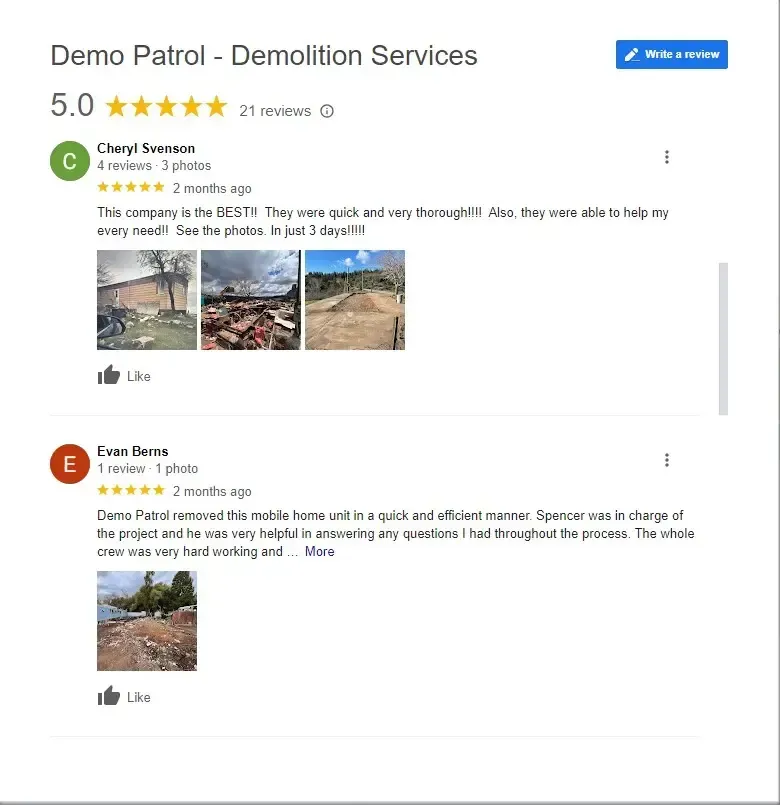
8. Communication and Customer Service
Communication in any demolition project is of utmost importance; indeed, it is necessary. Let us explore why strong communication channels and exceptional customer service are integral parts of the demolition process, as well as what to expect when engaging a professional demolition team.
The Crucial Role of Communication
Effective communication is the cornerstone of an efficient demolition operation from start to finish. From your initial contact with a demolition contractor through clearing away every piece of debris, effective dialogue ensures your individual requirements are understood and met while any issues are quickly addressed.
- Initial Consultation
To start off the process of demolition, an in-depth discussion about your needs must take place. Here, you outline exactly what work needs to be completed while the contractor provides you with detailed information on their strategy for approaching it. It is vital that this discussion clarifies every aspect of the job including timelines, scope of work, and desired outcomes.
- As Your Project Progresses
As your demolition progresses, the contractor should keep you up-to-date with its progress. Regular updates can help identify and address potential issues before they escalate - such as unexpected structural demolition challenges or weather-related delays - quickly. These updates may come via daily briefings, emails, or even a dedicated client portal that tracks project status in real time.
- Post-Demolition
Once demolition has concluded, good communication remains paramount. A debriefing should take place, covering what was done, any issues encountered, and confirmation of site conditions post-cleanup. During this meeting, you should voice any final queries or require additional services such as site grading or preparation for new construction projects.
Expectations for Customer Service
Customer service excellence is what separates good demolition services from exceptional ones. Here's what top-tier service looks like in this industry,
- React Timely
Our responsive service team is on standby 24/7/365 to respond swiftly to calls or messages and provide timely reassurances and solutions when any emergencies or concerns arise during demolition work. This is essential if there are issues to deal with during the demolition process itself.
- Transparency
From pricing to procedures, every aspect of demolition should be transparent. No hidden fees or surprise charges should arise during this process, while contractors should openly address any potential difficulties or delays that might impede completion.
- Professionalism
Each interaction should be conducted with the highest levels of professionalism, from showing respect and courtesy when visiting your property to running efficiently with minimum disruption to both you and your surroundings.
- Adaptability
An essential aspect of excellent customer service is adapting to meet the individual needs of each customer. From changing project timelines or accommodating special requests to providing flexibility when needed - having contractors who will work with you to meet these requirements is invaluable.
Conclusion: Wrapping Up Your Mobile Home Demolition Journey
As we explored the intricate aspects of taking a mobile home apart, we've highlighted its subtleties and critical considerations that ensure a successful process. From understanding specific requirements for mobile house demolition and home removal to any special challenges they present to selecting demolition contractors with strong credentials in safety, environmental responsibility, client communication, and overall commitment.
Key Takeaways
- Specialized Knowledge is Essential: Demolition of mobile homes requires specific skills and equipment due to its complex construction and materials. Make sure your demolition contractor understands these complexities.
- Licensing and Insurance Protect: Hiring a licensed and insured demolition contractor protects your interests by assuring compliance with laws, as well as providing indemnity against potential liabilities.
- Experience Matters: Look for a demolition contractor with an impressive portfolio of successful demolitions to demonstrate their capacity and dependability.
- Safety Cannot Be Overstated: Sound safety measures are paramount not just to meet compliance but for everyone's wellbeing as a whole.
- Environmental Impact: Select a demolition contractor who prioritizes responsible debris disposal and recycling practices to minimize environmental harm.
- Clear Communication: Maintaining open and honest communications throughout the demolition process ensures transparency and helps set expectations, making everyone's experience less taxing.
Choosing Your Demolition Contractor
When selecting the ideal demolition contractor, remember that selecting one should go beyond simply cost. Finding a partner to navigate the complexities of demolition with your best interests at heart requires more than price alone. Look for demonstrated expertise, strong safety, and environmental standards compliance, communicative customer-focused service models as well as demonstrated expertise. Do your research; read reviews; check references; don't be shy to ask hard questions about processes and projects undertaken.
Demolition isn't simply about taking down walls; it sets the scene for whatever comes next, from new construction projects (be it residential or commercial), land clearing efforts, or simply clearing space. A successful and professional approach should be taken to its execution to create the foundation needed for success in whatever comes next.
Thank you for exploring this comprehensive guide on demolishing a mobile home. With your newly acquired knowledge and a carefully chosen demolition contractor in hand, now is your opportunity to oversee an effective yet safe demolition that lays the groundwork for future plans with confidence.
Ready to take the next step in your mobile home demolition project?
Contact us at
Demo Patrol today! With our expertise, commitment to safety, and dedicated customer service, we're here to ensure your demolition process is smooth and successful. Don't wait—reach out to us now at 916-409-6879 or
fill out the form here to get started on paving the way for your plans!

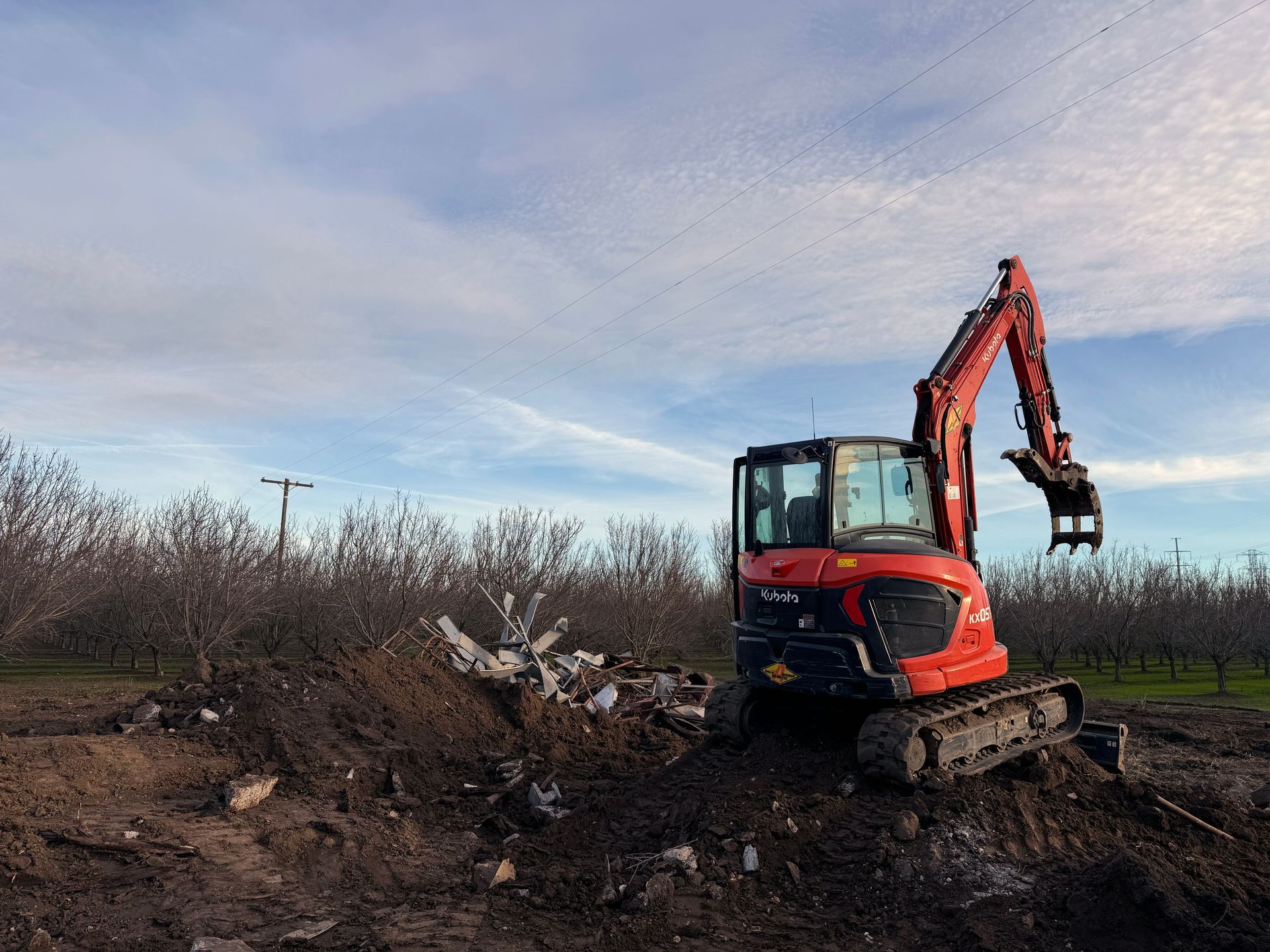
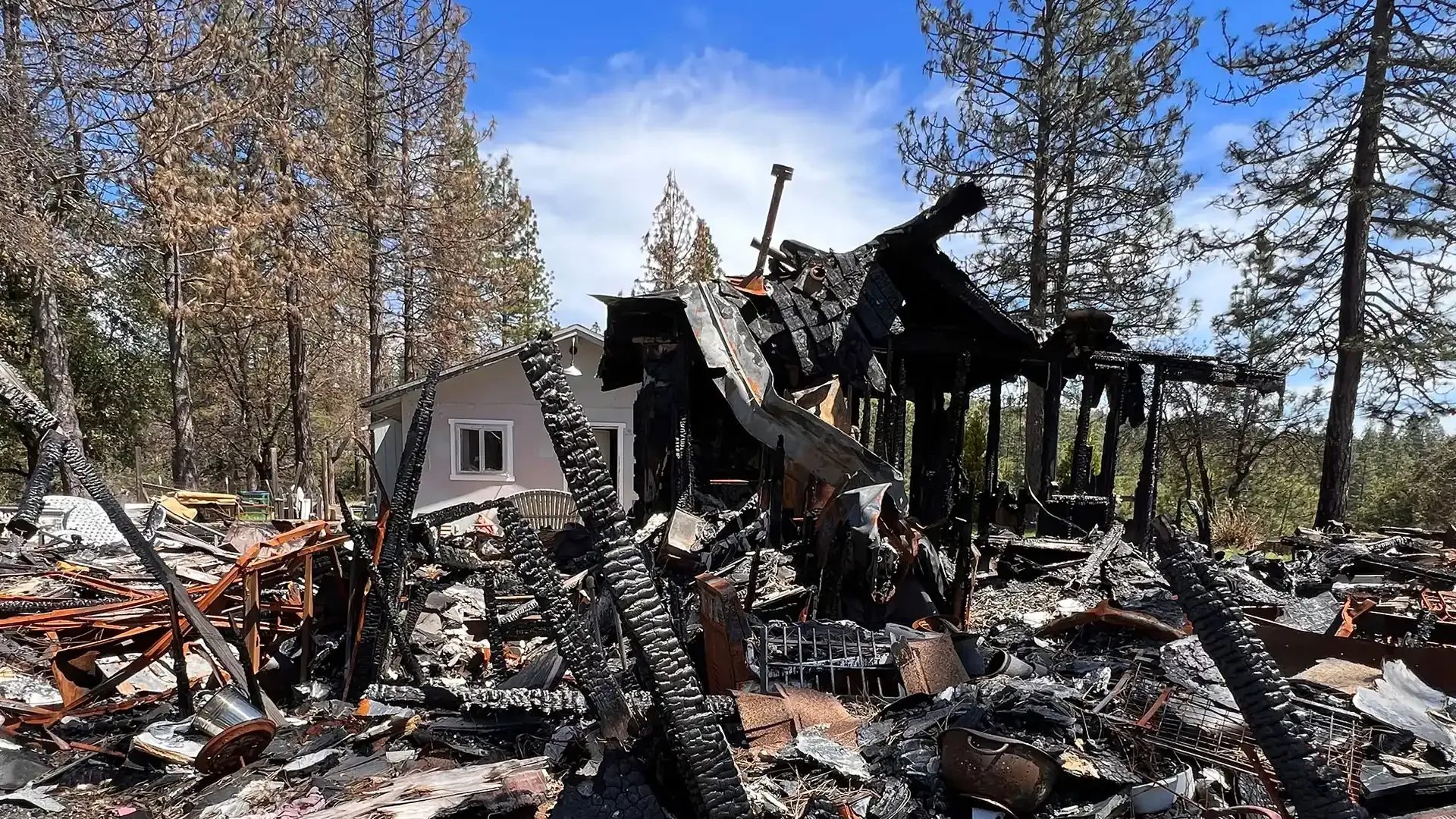
CONTACT INFO
Phone Number: 916 409 6879
OSHA-10 Certified Contractor
Licensed For Demolition In California
All Rights Reserved | Demo Patrol | Website Designed by Blue Crocus Solutions | Privacy Policy | TOS

